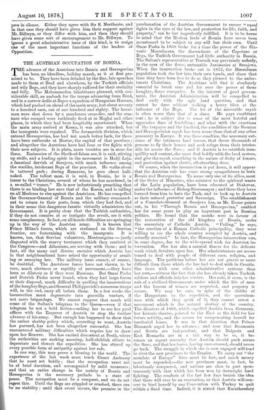THE AUSTRIAN OCCUPATION OF BOSNIA.
THE advance of the Austrians into Bosnia and Herzegovina has been no bloodless, holiday march, as it at first pro- mised to be. They have been deluded by the fine, fair speeches
made to them at Brod and elsewhere, by the Turkish officials and wily Begs, and they have sharply suffered for their credulity and folly. The Mahommedan inhabitants planned, with con- siderable skill, an ambush for the troops advancing from Brod, and in a narrow defile at Zepze a squadron of Hungarian Hussars, which had pushed on ahead of the main army, lost about seventy to a hundred men, out of one hundred and eighty. The horse- men were shot down by a murderous cross-fire, and the rem- nant who escaped were ruthlessly fired at in Maglai and other places, in which they had been hospitably entertained. When the main army arrived at Kosna, it was also attacked, but the insurgents were repulsed. The Jovanovich division, which entered Herzegovina, has had not much better luck, for there have been outbreaks at Mostar, the capital of that province ; and altogether the Austrians have had four or five fights with their new subjects. It is plain, more troubles are in store for them. Emissaries of the Sheik-ul-Islam are, it is said, stirring up strife, and a leading spirit in the movement is Hadji Loja, a fanatical dervish of Serajevo, with much influence among the warlike, intolerant Begs of the province. He walks about in tattered garb ; during Ramazan, he goes about half- naked. The tallest man, it is said, in Bosnia, he is a terror to the Christians, several of whom he has murdered, in a so-called "trance." He is now industriously preaching that there is no binding law save that of the Koran, and is calling on all Moslems to rise against the Austrians. He has compelled the Governor-General of Bosnia and the military command- ant to return to their posts, from which they had fled, and in their name this dangerous fanatic virtually administers the Government. It is pretty clear that the Turkish authorities, if they do not connive at or instigate the revolt, see it with some complacency. In fact, on all hands difficulties are springing up in the way of the Austrian army. It is known that Prince Milan's forces, which are stationed on the Servian frontier, are fraternising with the insurgents. It is known, too, that Servian volunteers, Montenegrins — justly disgusted with the scurvy treatment which they received at the Congress—and Albanians, are serving with them ; and in fact, all the many and diverse enemies which Austria has in that neighbourhood have seized the opportunity of assail- ing or annoying her. The military issue cannot, of course, be doubtful. The Austrians forces have not shown, to be sure, much alertness or rapidity of movement,—they have been as dilatory as if they were Russians. But Omar Pasha and Dervish Pasha never found, when they had large forces at their disposal, much difficulty in quelling the insurrections of the haughty Begs, and General Philippovich's numerous troops will, in the end, carry all before them. In a few weeks the insurrection must degenerate into guerrilla warfare, if not mere brigandage. We cannot suppose that much will come of the Sultan's telegram to the Queen—even if that telegram be not a bold fiction—asking her to use her good offices with the Emperor of Austria to stop the further advance of his army. But enough has happened to show that the rather shabby policy which, according to wont, Austria has pursued, has not been altogether successful. She has encountered military difficulties which require her to draw upon her Reserve. She has excited discontent at Pesth, where the authorities are making amusing, half-childish efforts to depreciate and thwart the expedition. She has stirred up every possible form of antipathy against her rule. In one way, this may prove a blessing to the world. The experience of the last week must teach Count Andrassy that he must act boldly ; that the occupation must not be of brief duration, and accompanied by mild measures ; and that an entire change in the society of Bosnia and Herzegovina is the necessary prelude to a state of peace. The occupation must be a conquest, and we do not regret this. Until the Begs are crippled or crushed, there can be no stability ; until that event occurs, the promise in the proclamation of the Austrian Government to ensure "equal rights in the eyes of the law, and protection for life, faith, and property," can be but imperfectly fulfilled. It is to be borne in mind that the Moslem lords of Bosnia have never been accustomed to be subject to any will but their own. Until Omar Pasha in 1850 broke for a time the power of the Sla- vonic Mussulmans, the descendants of the Capetans or Begs, the Turkish Government had little authority in Bosnia. The Sultan's representative at Travnik was previously nohddjr, in the eyes of the fierce, untamable Janissaries at Serajevo. When the insurrection broke out in 1872, the Mussulman population took the law into their own hands, and since that time they have been free to do as they pleased to the unfor- tunate Christians. The Austrians will find it absolutely essential to break once and for ever the power of these haughty, fierce renegades. In the interest of good govern- ment., the Austrian Administration will be compelled to deal early with the ugly land question, and that cannot be done without striking a heavy blow at the influence of the Begs. The lot of the miserable rayah is often worse than that of a slave. He pays exorbitant rent ; he is subject also to some of the most hateful and oppressive dues of feudalism ; and what with the exactions of the taxpayer and the landlord, the condition of the Bosnian and Herzegovinian rayah has been worse than that of any other peasantry in Europe. It was these cruelties, the necessary out- come of the infamous land tenure, that drove thousands of persons to fly their homes and seek refuge from their intoler- able lot across the Save ; and if Austria is to establish tran- quillity and content, she must deal boldly with the land system, and give the rayah something in the nature of fixity of tenure, and protection against elastic, all-absorbing dues.
Of course, when the insurrection is put down, it will appear that the Austrian rule has some strong sympathisers in both Bosnia and Herzegovina. To name only one of its allies, most of the Order of Minorites, who minister to the spiritual wants of the Latin population, have been educated at Diakovar, under the influence of Bishop Strossmayer ; and there they have learned from him to hate the Turk, and to look up to Austria as their natural protector and Sovereign. The establishment of a Consulate-General at Serajevo has, as Mr. Evans points out, in his "Through Bosnia and Herzegovina," enabled her for some years to play an important part in Bosnian politics. He found that the monks were in favour of the restoration of the old kingdom of Bosnia, under the suzerainty of Catholic Austria. "Failing," he says, "the erection of a Roman Catholic principality, they were willing to see the whole country occupied by Austria, and actually annexed." In fact, the Herzegovina insurrection was, in some degree, due to the wide-spread wish for Austrian in- tervention. She has also a natural fitness for the delicate work which devolves upon her. Her administrators are accus- tomed to deal with people of different race, religion, and language. The problems before her are not graver or more difficult than those which she has had to deal with in Croatia. She fuses with ease other administrative systems than her own,—witness the fact that she has already taken Turkish soldiers and officials into her service. Her rule, if stern, is the rule of a civilised Government, under which the life of men and the honour of women are respected, and property is secure. We may be sure, in spite of the dislike of the Hungarians to the expedition, and the querulous- ness with which they speak of it, they cannot arrest a movement which is the natural destiny of the country.
The disasters of 1866, which expelled Austria from Germany, her histmic theatre, pointed to the East as the field for her future activity, and the means for compensating herself for territorial losses. It was in that direction that Prince Bismarck urged her to advance ; and now that Roumania and Servia are independent, and that Bulgaria and East Roumelia are in a fair way to be so, it be- comes an urgent necessity that Austria should push across the Save, and that her forces, having once crossed, should never go back. The struggle in which she is now engaged will tend to rivet the new provinces to the Empire. To carry out "the mandate of Europe" lives must be lost, and much money must be expended,—the new provinces must, in fact, be laboriously conquered, and nations are slow to part spon- taneously with that which has been won by downright hard fighting. The combats of the last few days banish the idea that there will ever be an evacuation, or that Austria will con-
sent to bind herself by any Convention with Turkey to quit within a fixed time. Indeed, it is stated that Karatheodory Pasha has abandoned all hope of obtaining such an agreement. Apparently, the occupation of Bosnia has already become the conquest of Bosnia, and Austria will act, no doubt, as other countries do which have acquired by force of arms a valuable frontier and recruiting field,—will keep them as long as she can.































 Previous page
Previous page